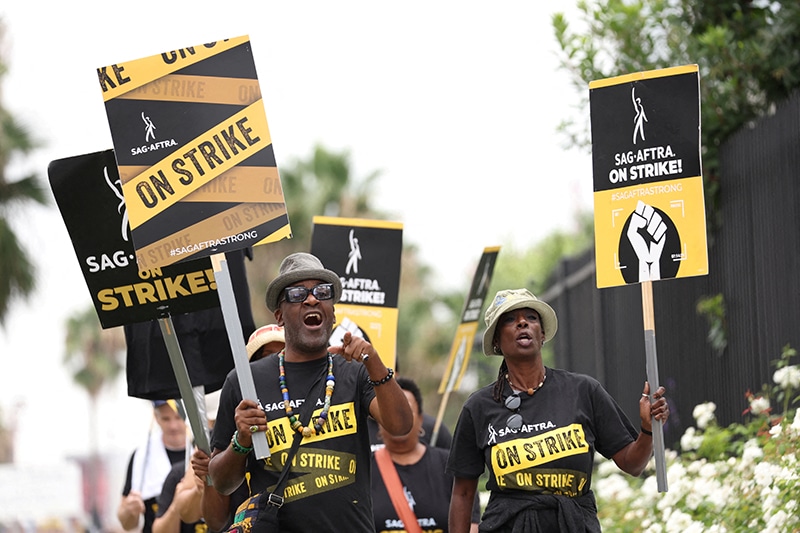After a move that could have ended the strike as it began, CONSTANTINOS PSILLIDES says we can now look forward to shows coming back
The writers’ strike that brought film and series production in Hollywood to a screeching halt for 146 days was resolved this week with an outcome that can only be described as a massive win for collective bargaining.
As it became evident that writers and actors’ unions would not budge and following news that the industry lost $3 billion due to the work stoppage, the four top industry executives descended from their ivory towers and joined a marathon negotiation designed to put an end to the strike.
Ted Sarandos of Netflix, David Zaslav of Warner Bros. Discovery, Donna Langley of Universal Pictures, and Bob Iger, the CEO of ABC7’s parent company Disney hashed things out with union representatives and came out on September 25 with a tentative deal in hand, to be revisited in 2026. A deal union reps described as “exceptional” with “meaningful gains and protections for writers.”
Before we go into the specifics, here’s the depressing thing about the deal: it gave writers almost exactly what they asked for in the first place. Sure, they made some concessions (allowing the practice of mini-writer rooms to continue was a major one) but overall, the final deal tilted in their favour. The studios just gave in.
Which means this whole mess could have been avoided.
Had the four studio heads set aside their greed and massively inflated egos from the start and just recognised that the writers’ demands were reasonable, they could have saved billions. A negotiation insider said it best: “It was never about the money. These are powerful people who are used to getting their way. They weren’t going to be told by some union reps what they could and could not do”. Just imagine the amount of goodwill the studios could have built with the people who generate so much income for them had they agreed to this deal four months ago. Instead, they made sure that every single villain in films and series for the next two years is a studio head. Oh well.
As far as the deal goes, some of the major provisions are:
Minimum staffing
A major sticking point was the so-called “mini writer rooms”. In a nutshell, these are teams of a maximum of four writers (including the showrunners) tasked with writing an overview of the series and the pilot to show studios where the project was heading so they could plan accordingly. As this was done before the project was greenlit it was outside the scope of WGA rules so the studios paid the writers as little as possible. It soon became evident that the more work those underpaid writers did before the show was greenlit, the less the studios had to pay writers afterwards.
While WGA wanted to abolish the practice, it agreed to the next best thing: ensuring that those writers would be adequately rewarded for their work, by receiving a “writer-producer” credit, which translates to higher pay and higher residuals. Under the agreement the number of writers increases for shows with more than six episodes per season, so get ready for an avalanche of six-episode series.
Use of AI
While they failed to agree on the general use of AI, the two sides agreed that any AI-generated work would not be considered as source material so rewriting it would constitute original work thus requiring studios to pay the original writer’s fees. Studios are also required to disclose whether the writers are given AI-generated scripts to work on and that the writers cannot be forced to use AI tools. Regulating AI is a major win for the union, considering that the studio’s original offer was “We will meet regularly to discuss the use of AI”.
Finally, the writers scored a major win when it came to residuals on streaming platforms, both for original work and work acquired by streamers after the show’s original broadcast run. The new deal provides a major boost in residuals: streaming services are required to provide viewership numbers and the higher the number of subscribers watching the show, the higher the number of residuals. The studios were even forced to agree to a bonus for larger projects, depending on their success. It should be noted that residuals were a red line for the studios.
In the end, the writers won. Despite having to go without an income for months, people crossing the picket line (looking at you Drew Barrymore and Bill Maher) and threats of being blacklisted, sticking to the cause and not crossing the picket line worked and resulted in better days for everyone.
Now that this is over, bring on the show!







Click here to change your cookie preferences